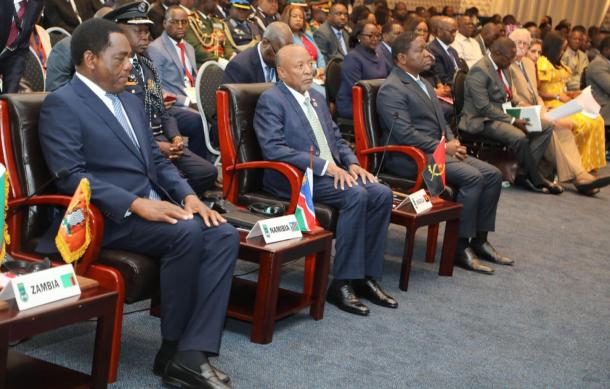
President Nangolo Mbumba has commended the Kavango-Zambezi Transfrontier Conservation Area (KAZA-TCFA) for the organisation's efforts and effect on Namibia.
As part of the KAZA 2024 summit resolutions, member states have been urged to immediately implement the KAZA destination brand and join the KAZA UNIVISA system.
Speaking to nbc News on the sidelines of the summit on Friday, the Minister of Environment, Forestry, and Tourism, Pohamba Shifeta, said that the branding will market the member states as a collective.
"With that branding, we are now going to make sure that we market KAZA; that means it's five countries when it comes to tourism collectively, so there will be no Namibia, Angola, Zambia, Zimbabwe, or whatever country now the five, marketing on its own when it comes to these regions, so we are going to market collectively and we are going to use that brand in all our countries to market that region."
In agreement, the executive director of the KAZA Secretariat, Dr. Nyambe Nyambe, said the launch of the KAZA tourism branding addresses the need for member states to harmonise policy strategies around tourism.
The KAZA destination trademark was launched on Wednesday by ministers responsible for environment and tourism within the five member states.
Another key area as part of the summit resolutions is the need to expand the KAZA UNIVISA system to all five countries.
Dr. Nyambe said this comes after the programme was initially implemented between Zambia and Zimbabwe in 2014.
"The idea is to contribute to ease of movement and create a positive experience of tourism, both domestic and international. But it has so far been working in Zambia and Zimbabwe, and for Botswana, a day visit to Chobe National Park is applicable if you have a KAZA visa. But with the pronouncements made today, we need to engage our respective immigration authorities, and we've been actually trying to do some rolling out exercises already over the past two years."
Dr. Nyambe said that this means an alignment of systems and efficiency in border and immigration facilities.
"Importantly, it means if you get a visa, say, going into Zimbabwe, you can easily get into Zambia, Botswana, Namibia, or Angola. The whole idea, as you have heard, is that the partner states want to do all kinds of things around tourism to improve ease of access, movement, infrastructure, and quality of service. You heard Angola's plans; they are going to put in millions in the Kwando-Cubango area as part of the tourism implementation plan; these are part of the public works ready to be approved in the case of Angola."
Nyambe said consultations on the expansion and rollout of the KAZA UNIVISA have already been made with Namibia and Botswana, except for Angola.
The summit further noted the need to establish an engagement mechanism for communities in the tourism value chain to enable improved financial and non-financial benefits from the industry and diversify tourism products.
The summit also expressed the need to enhance connectivity across the KAZA region through direct flights, an efficient border management system, and road and air infrastructure.





